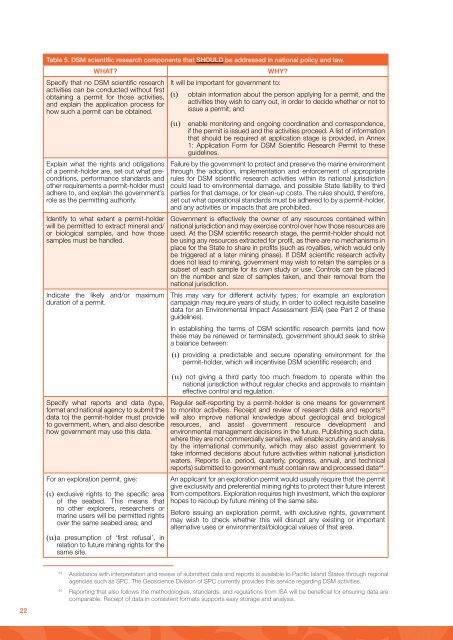REGIONAL SCIENTIFIC RESEARCH GUIDELINES
RSRG2016
RSRG2016
Create successful ePaper yourself
Turn your PDF publications into a flip-book with our unique Google optimized e-Paper software.
Table 5. DSM scientific research components that SHOULD be addressed in national policy and law.<br />
WHAT?<br />
Specify that no DSM scientific research<br />
activities can be conducted without first<br />
obtaining a permit for those activities,<br />
and explain the application process for<br />
how such a permit can be obtained.<br />
Explain what the rights and obligations<br />
of a permit-holder are, set out what preconditions,<br />
performance standards and<br />
other requirements a permit-holder must<br />
adhere to, and explain the government’s<br />
role as the permitting authority.<br />
Identify to what extent a permit-holder<br />
will be permitted to extract mineral and/<br />
or biological samples, and how those<br />
samples must be handled.<br />
Indicate the likely and/or maximum<br />
duration of a permit.<br />
Specify what reports and data (type,<br />
format and national agency to submit the<br />
data to) the permit-holder must provide<br />
to government, when, and also describe<br />
how government may use this data.<br />
For an exploration permit, give:<br />
(i) exclusive rights to the specific area<br />
of the seabed. This means that<br />
no other explorers, researchers or<br />
marine users will be permitted rights<br />
over the same seabed area; and<br />
(ii) a presumption of ‘first refusal’, in<br />
relation to future mining rights for the<br />
same site.<br />
WHY?<br />
It will be important for government to:<br />
(i) obtain information about the person applying for a permit, and the<br />
activities they wish to carry out, in order to decide whether or not to<br />
issue a permit; and<br />
(ii) enable monitoring and ongoing coordination and correspondence,<br />
if the permit is issued and the activities proceed. A list of information<br />
that should be required at application stage is provided, in Annex<br />
1: Application Form for DSM Scientific Research Permit to these<br />
guidelines.<br />
Failure by the government to protect and preserve the marine environment<br />
through the adoption, implementation and enforcement of appropriate<br />
rules for DSM scientific research activities within its national jurisdiction<br />
could lead to environmental damage, and possible State liability to third<br />
parties for that damage, or for clean-up costs. The rules should, therefore,<br />
set out what operational standards must be adhered to by a permit-holder,<br />
and any activities or impacts that are prohibited.<br />
Government is effectively the owner of any resources contained within<br />
national jurisdiction and may exercise control over how those resources are<br />
used. At the DSM scientific research stage, the permit-holder should not<br />
be using any resources extracted for profit, as there are no mechanisms in<br />
place for the State to share in profits (such as royalties, which would only<br />
be triggered at a later mining phase). If DSM scientific research activity<br />
does not lead to mining, government may wish to retain the samples or a<br />
subset of each sample for its own study or use. Controls can be placed<br />
on the number and size of samples taken, and their removal from the<br />
national jurisdiction.<br />
This may vary for different activity types; for example an exploration<br />
campaign may require years of study, in order to collect requisite baseline<br />
data for an Environmental Impact Assessment (EIA) (see Part 2 of these<br />
guidelines).<br />
In establishing the terms of DSM scientific research permits (and how<br />
these may be renewed or terminated), government should seek to strike<br />
a balance between:<br />
(i) providing a predictable and secure operating environment for the<br />
permit-holder, which will incentivise DSM scientific research; and<br />
(ii) not giving a third party too much freedom to operate within the<br />
national jurisdiction without regular checks and approvals to maintain<br />
effective control and regulation.<br />
Regular self-reporting by a permit-holder is one means for government<br />
to monitor activities. Receipt and review of research data and reports 43<br />
will also improve national knowledge about geological and biological<br />
resources, and assist government resource development and<br />
environmental management decisions in the future. Publishing such data,<br />
where they are not commercially sensitive, will enable scrutiny and analysis<br />
by the international community, which may also assist government to<br />
take informed decisions about future activities within national jurisdiction<br />
waters. Reports (i.e. period, quarterly, progress, annual, and technical<br />
reports) submitted to government must contain raw and processed data 44 .<br />
An applicant for an exploration permit would usually require that the permit<br />
give exclusivity and preferential mining rights to protect their future interest<br />
from competitors. Exploration requires high investment, which the explorer<br />
hopes to recoup by future mining of the same site.<br />
Before issuing an exploration permit, with exclusive rights, government<br />
may wish to check whether this will disrupt any existing or important<br />
alternative uses or environmental/biological values of that area.<br />
22<br />
43<br />
Assistance with interpretation and review of submitted data and reports is available to Pacific Island States through regional<br />
agencies such as SPC. The Geoscience Division of SPC currently provides this service regarding DSM activities.<br />
44<br />
Reporting that also follows the methodologies, standards, and regulations from ISA will be beneficial for ensuring data are<br />
comparable. Receipt of data in consistent formats supports easy storage and analysis.


